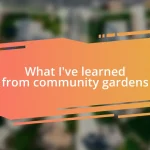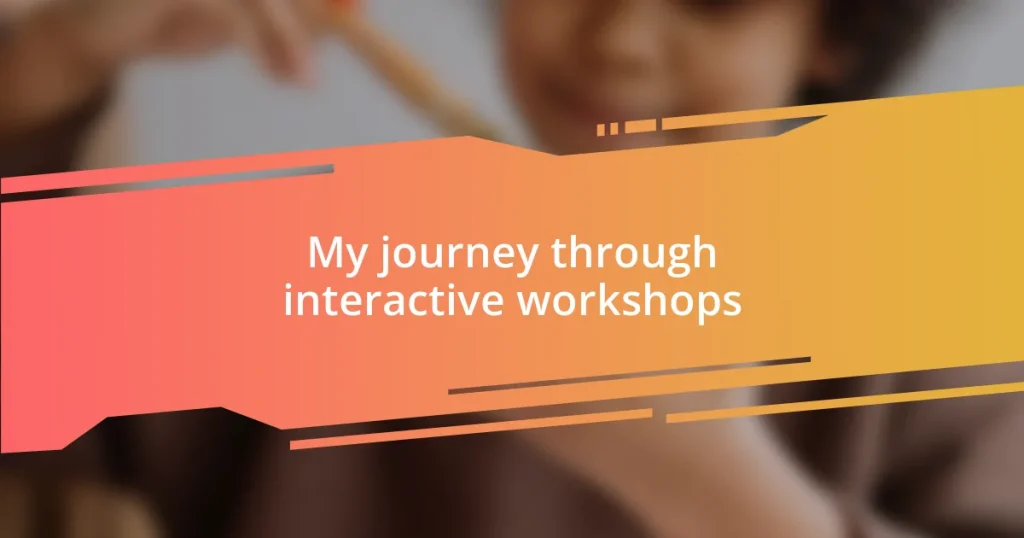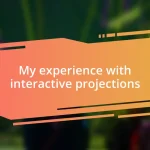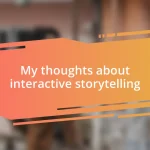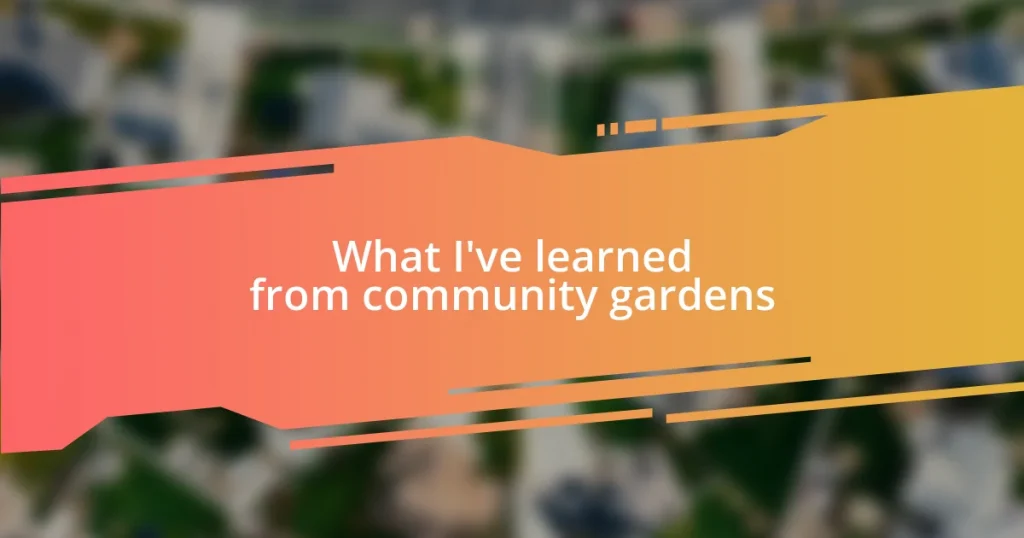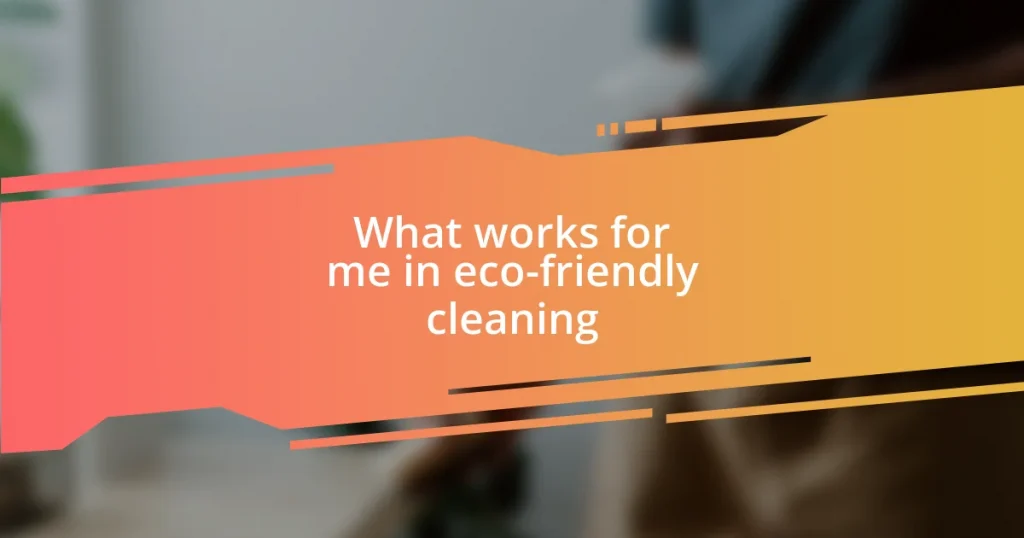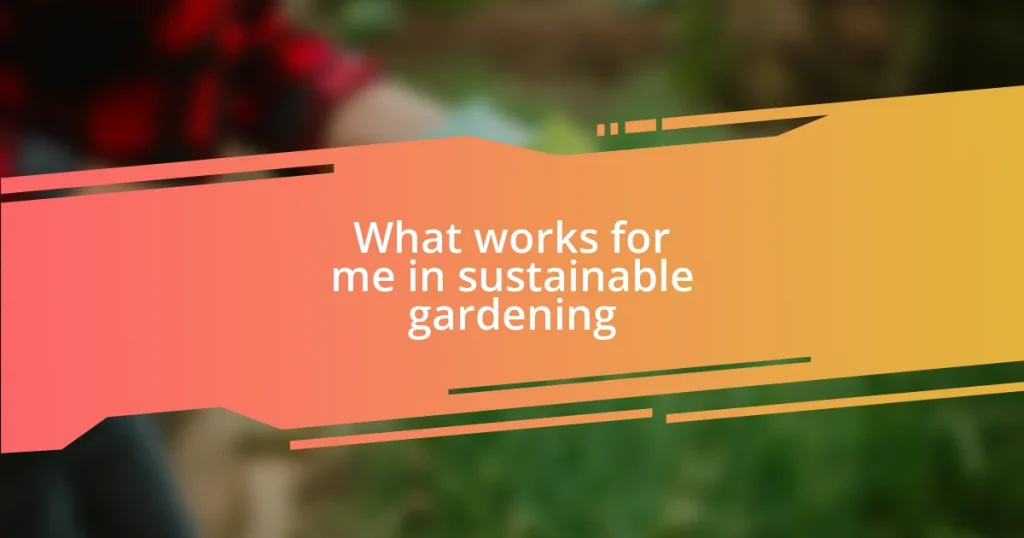Key takeaways:
- Interactive workshops thrive on participant engagement, fostering collaboration and creativity through tailored formats and clear objectives.
- Effective participant engagement involves creating an inclusive atmosphere, using targeted questions, and incorporating interactive tools for heightened involvement.
- Evaluating workshop outcomes is essential for understanding effectiveness, with reflective practices and feedback enabling continuous improvement and application of lessons learned.
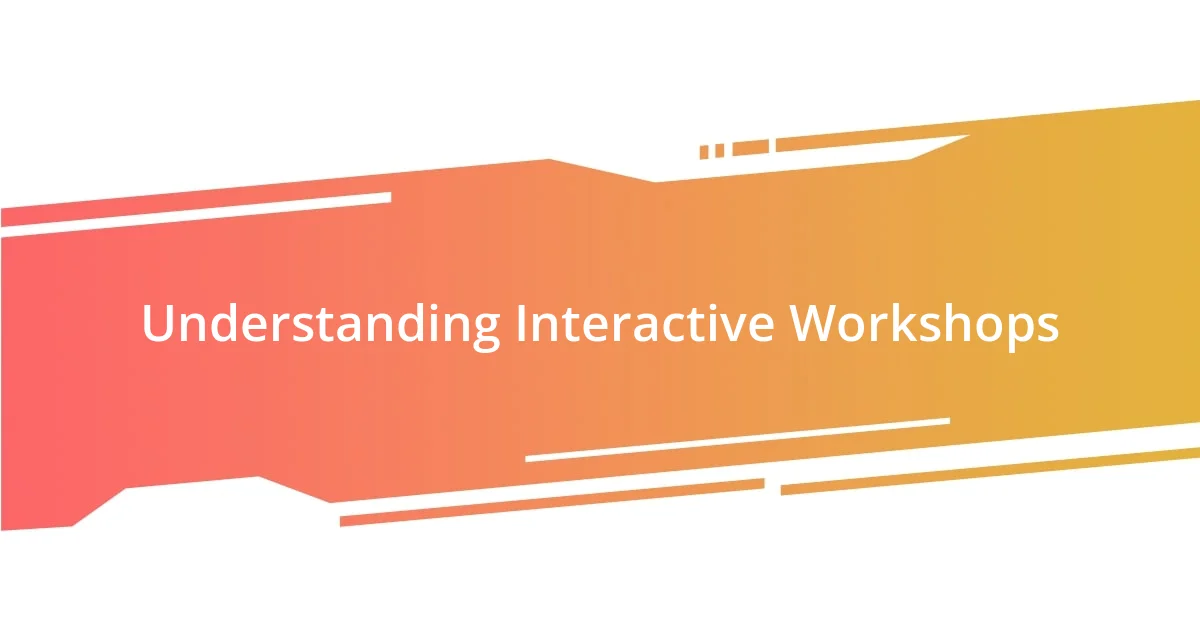
Understanding Interactive Workshops
Interactive workshops are dynamic environments that thrive on participant engagement. I remember the first workshop I attended; it was overwhelming yet exhilarating, transforming conventional learning into something profoundly participatory. Engaging directly with others made the experience feel alive, and I found myself asking, “How can so much energy come from just sharing ideas?”
At their core, interactive workshops are designed to foster collaboration and creativity. I’ve often encountered moments during these sessions where the exchange of perspectives took a simple topic and expanded it into something beautiful—a true tapestry of thought. Have you ever sat in a group where a single question sparked a heated debate, encouraging everyone to dive deep into their viewpoints? That’s the magic of interactive workshops.
The beauty lies in their adaptability. I’ve seen them tailored to fit various audiences and objectives, from brainstorming sessions in corporate settings to art-based workshops for personal growth. Isn’t it fascinating how the same framework can yield such diverse outcomes? Each workshop can take on a unique life of its own, guided by the participants’ energy and contributions.
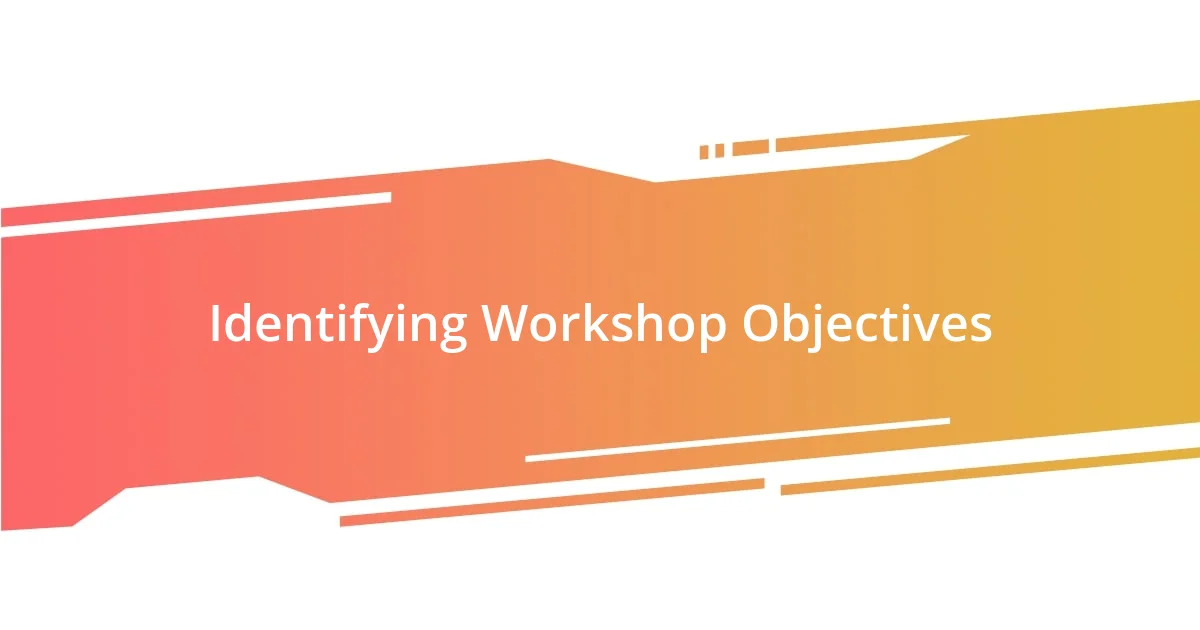
Identifying Workshop Objectives
Identifying the objectives of a workshop is pivotal in shaping the direction and energy of the session. I’ve learned that clarity in goals not only sets expectations but also ignites passion among participants. For instance, during a workshop I facilitated, we aimed to improve team communication. As we started, I could feel a shift in enthusiasm as everyone recognized a common purpose. When everyone knows why they’re there, the collaborative spirit flourishes.
Here are some key points to consider when identifying workshop objectives:
- Align with Participant Needs: Understanding what the participants seek helps tailor the focus.
- Clarity is Key: Clearly defined goals minimize confusion and keep everyone on track.
- Be Specific: Instead of vague objectives, opt for specific outcomes that can be measured or observed.
- Emotional Connection: Craft objectives that resonate emotionally to enhance engagement.
- Flexibility: Be ready to adapt goals based on the dynamics of the workshop; sometimes the unexpected leads to the best insights.
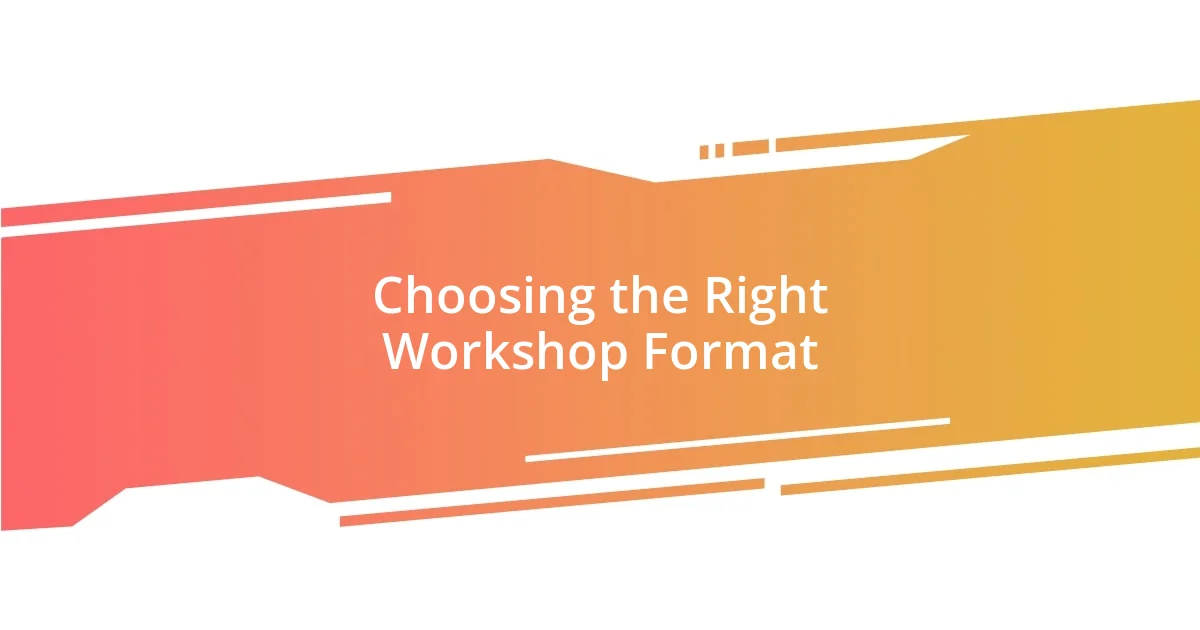
Choosing the Right Workshop Format
Choosing the right workshop format can significantly impact the overall experience and outcomes. I remember exploring various formats during my own journey, from small group discussions to larger panel formats. Each setting brought with it distinct energy levels; smaller groups felt intimate, allowing deeper connections, while larger ones buzzed with diverse opinions yet often led to quieter voices being drowned out. Have you ever felt lost in a crowd during a workshop, wishing for more individual attention?
Additionally, it’s crucial to align the format with your objectives. For instance, if your goal is to promote teamwork, a collaborative format like breakout sessions might work wonders. Conversely, if you want to disseminate information quickly, a lecture-style approach could be more effective. I once attended a workshop that used an immersive role-play format, which transformed dry concepts into compelling narratives. It made the learning experience not just informative but deeply impactful. Have you experienced a similar moment where the format genuinely enhanced your understanding?
Finally, considering the preferences and backgrounds of participants should not be overlooked. I recall a workshop aimed at creative professionals that shifted into a more interactive, hands-on approach after realizing many attendees thrived in a tactile learning environment. By being attuned to the participants’ needs, we crafted an experience that resonated deeply. Reflecting on your experiences, what formats have you found most engaging?
| Format Type | Description |
|---|---|
| Lecture-Based | Information dissemination from a presenter to a large audience. |
| Group Discussions | Small, focused conversations promoting active participation and idea sharing. |
| Hands-On Activities | Interactive sessions encouraging practical engagement and skill application. |
| Panel Discussions | A group of experts discussing a topic, allowing for diverse viewpoints. |
| Role-Playing | A simulation of real-life scenarios to explore concepts in-depth. |
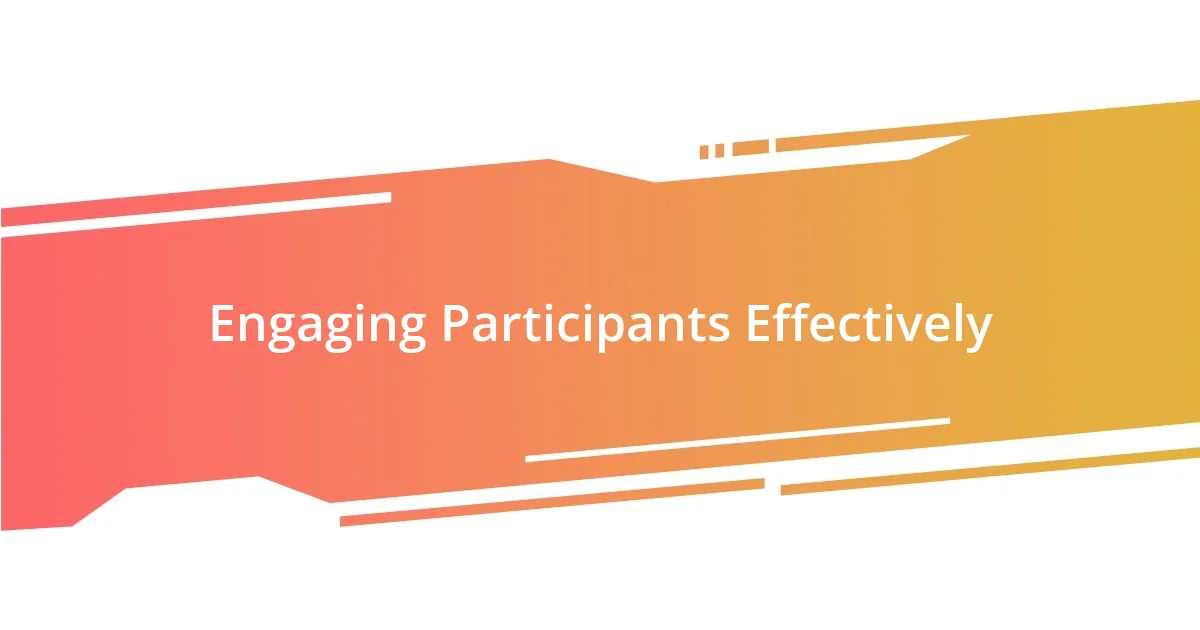
Engaging Participants Effectively
Engaging participants effectively starts with creating an inclusive atmosphere. I vividly recall a workshop where I used icebreaker activities that encouraged everyone to share a little about themselves. It was amazing to see how those early moments transformed hesitant individuals into eager contributors, sparking genuine connections. Have you ever witnessed how a simple gesture can dissolve barriers?
Active participation can also be enhanced through targeted questions. During a recent session, I organized a roundtable discussion that allowed for open dialogue. Instead of a one-way flow of information, participants expressed varied opinions, and the energy in the room shifted dramatically. A well-timed question can often lead to profound insights and unexpected revelations, making participants feel valued and heard.
Finally, incorporating interactive tools can significantly elevate engagement. For example, I once utilized live polls and real-time feedback apps, which allowed participants to share their thoughts anonymously. The excitement grew as they saw their responses directly influence the discussion. How do you think technology can reshape traditional workshop formats? It’s refreshing to see how embracing new methods can create a more dynamic and collaborative environment, keeping participants invested in the process.
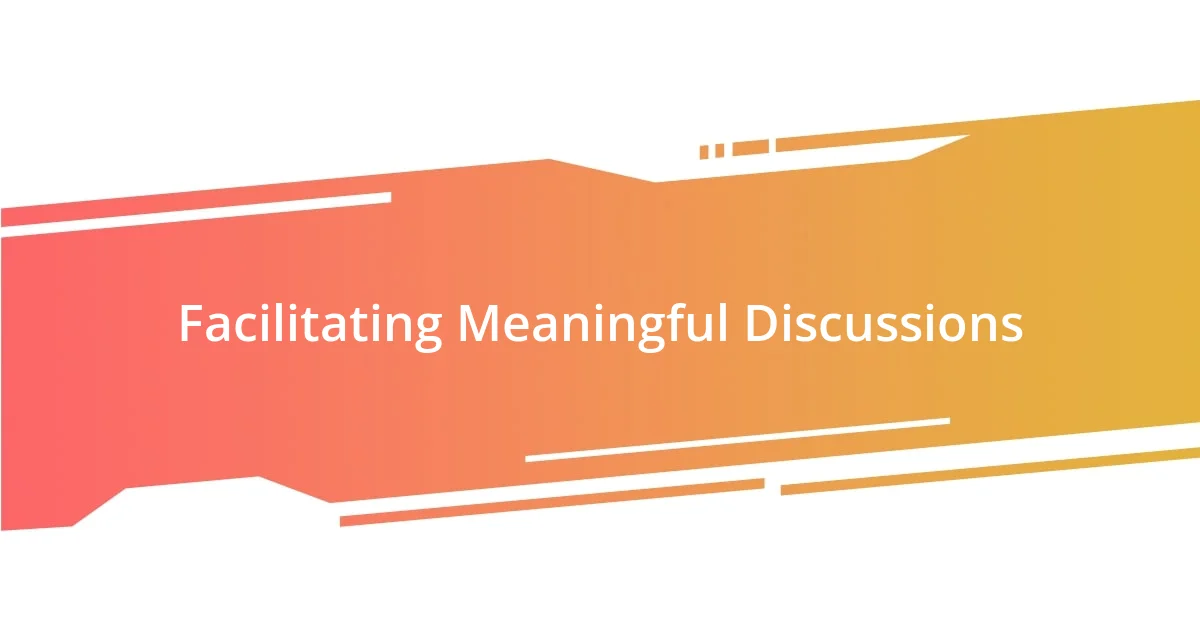
Facilitating Meaningful Discussions
Meaningful discussions are like the heartbeat of any workshop, providing rhythm and pulse to the entire experience. I recall a moment when, mid-discussion, someone shared a deeply personal story that shifted the entire atmosphere. It was inspiring to see how vulnerability opened the floodgates for others to share their own challenges and triumphs, creating a profound sense of community. Have you ever noticed how sharing experiences can turn a simple meeting into an impactful gathering?
Facilitating these discussions requires careful attention to the dynamics in the room. I remember a session where I intentionally paired participants with diverse viewpoints to foster engaging debates. The conversations became electric, as each viewpoint challenged and enriched the others. It’s fascinating how sometimes the best insights come from those who view things differently. What strategies have you found effective in bridging diverse perspectives during conversations?
Seeking feedback during these discussions is also vital. After one workshop, I had participants fill out exit surveys to gauge how they felt about the dialogue we shared. The feedback revealed that people craved even more opportunities for sharing and connecting. It was a reminder that facilitating discussions is an ongoing process. In your experience, how has asking for feedback shaped future conversations? Being attentive to these nuances forms the foundation for truly meaningful interactions.
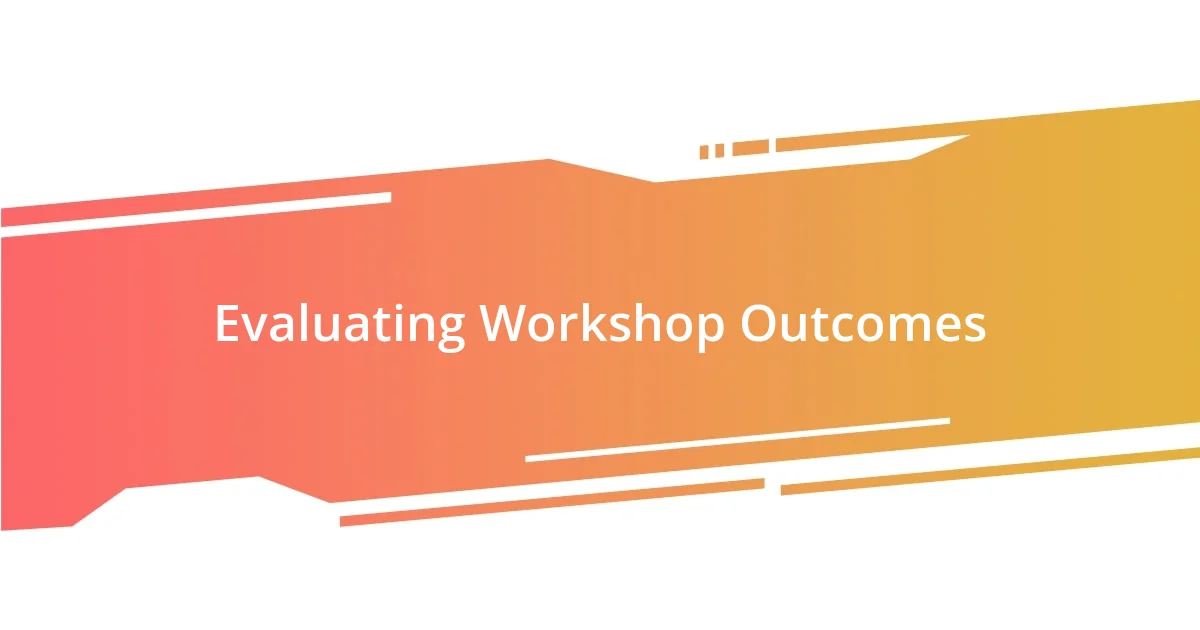
Evaluating Workshop Outcomes
Evaluating the outcomes of a workshop can feel like unwrapping a present—it’s often surprising and enlightening. After one of my workshops, I decided to gather participants for a feedback session rather than rely solely on surveys. Their candid reflections revealed what worked and what missed the mark. I felt a sense of fulfillment as they expressed how certain activities resonated with them, while others could have been more engaging. Have you ever discovered something unexpected through participant feedback that changed your perspective?
One memorable evaluation moment came when I introduced a follow-up activity several weeks post-workshop. Participants reported back on their implementation of ideas we’d discussed, and I was thrilled to hear about the tangible changes they made. Witnessing their progress reminded me that the impact of a workshop often extends far beyond the initial session. It’s fascinating how reflection can illuminate the practical applications of what was learned. What methods have you employed to ensure that the knowledge gained continues to evolve beyond a single event?
In addition, I prioritizing collective reflection during the evaluation process. I once facilitated a wrap-up discussion where participants could share their insights collectively, allowing everyone to voice how the workshop had impacted them. The collective wisdom that emerged painted a more vivid picture of our shared experience. I was struck by how much I learned from them in that moment. Every participant brought a unique perspective, deepening my understanding of the workshop’s effectiveness. How do you think incorporating group reflections can enhance the evaluation of workshop outcomes? This collaborative approach not only reinforces learning but also builds community among participants.
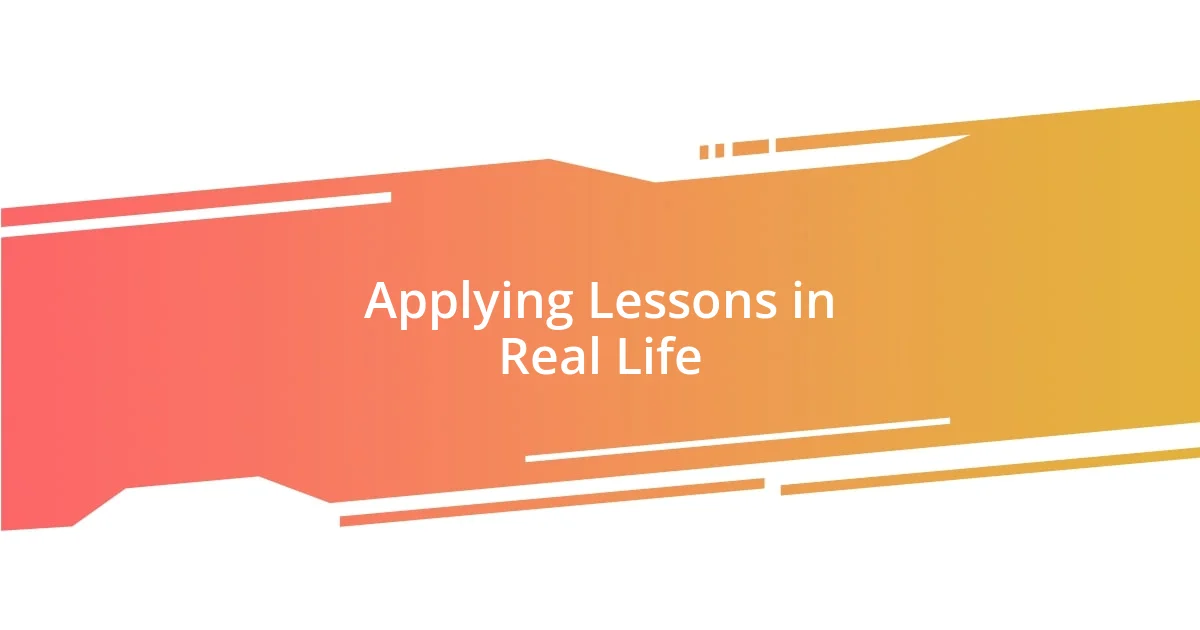
Applying Lessons in Real Life
It’s one thing to learn in a workshop and quite another to put those lessons into practice. I remember feeling a bit overwhelmed after attending a series of interactive sessions aimed at improving team collaboration. However, it was exhilarating when I began applying the communication techniques we discussed. Just weeks later, in a team meeting, I took a different approach to address conflicts—allowing everyone to voice their thoughts before jumping to conclusions. The shift in energy was palpable, and it reminded me how powerful it can be to actively implement new strategies.
Reflecting on those experiences, I often find myself asking: how do we ensure that the lessons stick? For me, journaling has proven invaluable. After each workshop, I jot down key insights and action steps, then revisit them regularly. Interestingly, I’ve noticed that I am more likely to carry those lessons forward if I see them written down. It’s like my own personal accountability partner, reminding me of the transformative power hidden within those discussions. Have you ever tried documenting your thoughts to reinforce learning?
As I continued incorporating workshop insights into my daily routine, I felt a growing sense of confidence. I made it a habit to share these lessons with colleagues, creating an informal mentorship dynamic. One day, a coworker approached me, expressing gratitude for a simple strategy I had shared during a casual chat. It dawned on me just how interconnected our journeys are. The more we share and apply what we learn, the more we build a supportive network. Isn’t it amazing how one conversation can ripple outwards, impacting others in unexpected ways?
